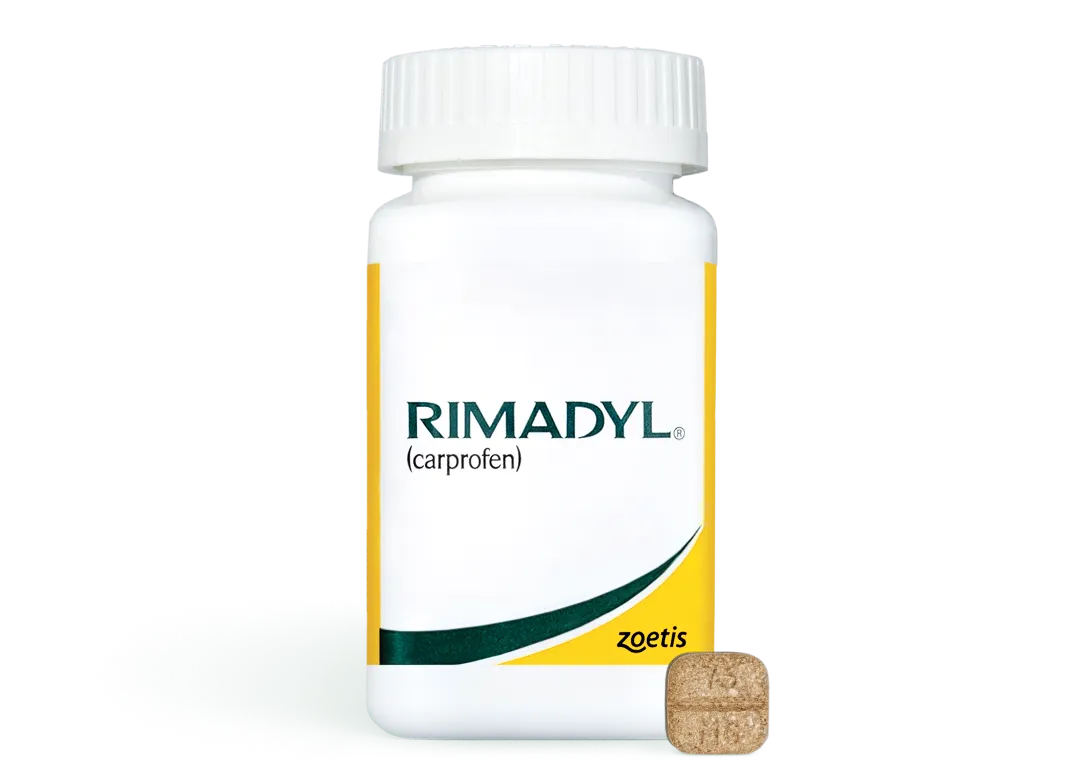
Osteoarthritis Can Hurt Your Dog in More Ways Than One — Rimadyl Can Help



The pain of osteoarthritis, or OA, may affect not only how dogs function but how they feel and act too. OA is a progressive condition involving the joints in which the cartilage protecting the ends of the bones breaks down over time, making movement more difficult and causing pain.
The most widely recognized & preferred name-brand non-steroidal anti-inflammatory drug (NSAID) by veterinarians.1 Rimadyl helps get dogs back to their playful, lovable selves.2
Are you missing the signs of your dog's OA pain? Take our quick quiz to find out.

No one knows your dog better than you. Spotting the signs of OA early can help you get your dog’s pain treated as soon as possible. Talk to your vet about an OA screening and how treatment with Rimadyl can make a big difference.
Rimadyl (pronounced “Rim-a-dill”) is a nonsteroidal anti-inflammatory drug (NSAID) approved for once- or twice-daily dosing to relieve the pain and joint inflammation of dogs with OA. It comes in easy-to-use caplets and tasty chewables. In a study, after just 2 weeks of taking Rimadyl at label dose, dogs had visible improvements in energy, happiness, activity level, comfort, and calmness.2
OA may affect about 37% of dogs, according to a US study based on screening 504 dogs.3
OA does not just come with old age – it affects dogs of all ages, sizes, and breeds.4 OA can affect any dog, even as young as 1 year old.
The pain of OA can impact your dog’s emotional health too. Signs of OA include stiffness after a long walk, reduced walk speed accompanied by panting, reluctance to move, and more withdrawn.5
Find Out Why Rimadyl dogs are happy dogs.

That’s why experts say it’s important to monitor your dog’s behavior and how they move around to help your veterinary team best manage your dog's OA pain.4,6
The most widely recognized & preferred name-brand non-steroidal anti-inflammatory drug (NSAID) by veterinarians.1 Rimadyl helps get dogs back to their playful, lovable selves.2
More than 3 billion doses dispensed.7
Over 29 million dogs treated.8
Over 25 years of research and innovation in OA pain.
Rimadyl is a choice backed by confidence. It was the first FDA-approved NSAID for dogs and has been used to treat over 29 million dogs.8

Continuous daily treatment with Rimadyl at label dose has been shown to significantly improve dogs’ functional ability and emotional wellbeing. To see how it improves both mobility and quality of life, view the study data below.2,3,9
Starting as early as 5 days after administration and continuing through day 120, dogs treated with Rimadyl showed improved mobility, Including:
In the first study to report the impact of continuous NSAID treatment for up to 240 days, taking Rimadyl at label dose provided rapid and ongoing improvements in both physical and emotional wellbeing.2

Rimadyl is such an effective treatment, you may see improvements in your dog’s pain in as little as 5 days.9 You might think it’s OK to stop when you see your dog is feeling better. But OA is a painful, progressive disease, so it's important to stick with the prescribed course. Your dog's pain can worsen if you stop treatment earlier than prescribed.10
Long-term treatment can provide continuous improvement in your dog’s OA pain and mobility, so your dog can stay involved in the activities you love to do together. Studies have shown that continuous use of NSAIDs—in particular Rimadyl—over the long term has been found to be safe.9,11
Although OA cannot be cured, if properly treated the progression can be slowed. The goals of OA treatment are to decrease pain and inflammation, resulting in:
Medical treatment of OA should include weight control, exercise, and NSAIDs for an improved quality of life.

Osteoarthritis, or OA, is a painful condition caused by “wear and tear” of cartilage and other parts of the joints that may result in physical and emotional changes in your dog, signs of which include:
A drop in energy level
The sooner OA is diagnosed, the better your dog’s pain can be managed. A good way to start is to take our quick dog OA pain quiz.
Rimadyl is a nonsteroidal anti-inflammatory drug, or NSAID, that’s used to reduce pain and inflammation (soreness) due to osteoarthritis and surgery in dogs. A licensed vet must prescribe Rimadyl for your dog. It’s available as a caplet and chewable tablet and is given to dogs by mouth.
The most widely recognized & preferred name-brand non-steroidal anti-inflammatory drug (NSAID) by veterinarians.1 Rimadyl helps get dogs back to their playful, lovable selves.2
Rimadyl works by blocking the production of certain body chemicals that cause inflammation. Its efficacy in treating OA makes it a trusted long-term treatment, as well as for short-term use after surgery. The nonsteroidal anti-inflammatory properties work to reduce joint inflammation while the analgesic properties work to reduce pain.
Rimadyl can relieve the pain and inflammation of OA and improve your dog’s mobility. Response varies from dog to dog but can be quite dramatic. In most dogs, improvement can be seen in a matter of days.
If Rimadyl is stopped or not given as directed, your dog’s pain and inflammation may come back since OA is a progressive condition. But continuous daily treatment with Rimadyl at label dose has been proven to significantly improve mobility, and emotional wellbeing.2,3 See how.
Your vet will need to assess your dog’s health and medication history to get to the source of the pain, and you play an important role since you know your dog best. If it turns out to be OA, the goals of treatment are to decrease pain and inflammation. This should involve weight control, exercise, and NSAIDs. See how you can partner with your veterinary team to best manage your dog’s OA pain.
While OA is progressive, a comprehensive treatment plan can manage your dog’s pain and help keep your furry friend active and playful. Learn how long-term treatment with Rimadyl can provide continuous improvement in your dog’s OA pain and mobility, so you can keep enjoying each other to the fullest.
IMPORTANT SAFETY INFORMATION: See Prescribing Information. As a class, NSAIDS may be associated with gastrointestinal, kidney and liver side effects. These are usually mild, but may be serious. Pet parents should discontinue therapy and contact their vet immediately if side effects occur. Evaluation for pre-existing conditions and regular monitoring are recommended for pets on any medication, including Rimadyl. Use with other NSAIDS or corticosteroids should be avoided.
References:
The product information provided in this site is intended only for residents of the United States. The products discussed herein may not have marketing authorization or may have different product labeling in different countries. The animal health information contained herein is provided for educational purposes only and is not intended to replace discussions with an animal healthcare professional. All decisions regarding the care of a veterinary patient must be made with an animal healthcare professional, considering the unique characteristics of the patient.